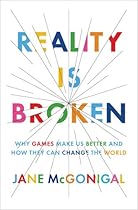Her web site.
Quotes from the book
"Reality is Broken"
"The truth is this: in today’s society, computer and video games are fulfilling genuine human needs that the real world is currently unable to satisfy. Games are providing rewards that reality is not. They are teaching and inspiring and engaging us in ways that reality is not. They are bringing us together in ways that reality is not."
"Why would we want to waste the power of games on escapist entertainment? Why would we want to waste the power of games by trying to squelch the phenomenon altogether? Perhaps we should consider a third idea. Instead of  teetering on the tipping point between games and reality, what if we threw ourselves off the scale and tried something else entirely?"
teetering on the tipping point between games and reality, what if we threw ourselves off the scale and tried something else entirely?"
 teetering on the tipping point between games and reality, what if we threw ourselves off the scale and tried something else entirely?"
teetering on the tipping point between games and reality, what if we threw ourselves off the scale and tried something else entirely?""When you strip away the genre differences and the technological complexities, all games share four defining traits: a goal, rules, a feedback system, and voluntary participation."
"Teasingly trash-talking allows us to provoke each other’s negative emotions in a very mild way—we stimulate a very small amount of anger or hurt or embarrassment. This tiny provocation has two powerful effects. First, it confirms trust: the person doing the teasing is demonstrating the capacity to hurt, but simultaneously showing that the intention is not to hurt. Just like a dog might play-bite another dog to show that it wants to be friends, we bare our teeth to each other in order to remind each other that we could, but never really would, hurt each other. Conversely, by allowing someone else to tease us, we confirm our willingness to be in a vulnerable position. We are actively demonstrating our trust in the other person’s regard for our emotional well-being."
"By letting someone tease us, we’re also helping them feel powerful. We’re giving them a moment to enjoy higher status in our social relationship—and humans are intensely attuned to shifts in social status. By letting someone else experience higher status, we intensify their positive feelings for us. Why? Because we naturally like people more when they enhance our own social status."
"Happiness hacking is the experimental design practice of translating positive-psychology research findings into game mechanics. It’s a way to make happiness activities feel significantly less hokey, and to put them in a bigger social context. Game mechanics also allow you to escalate the difficulty of happiness activities and inject them with novelty, so they stay challenging and fresh."
FIX # 1 : UNNECESSARY OBSTACLES Compared with games, reality is too easy. Games challenge us with voluntary obstacles and help us put our personal strengths to better use.
FIX # 2 : EMOTIONAL ACTIVATION Compared with games, reality is depressing. Games focus our energy, with relentless optimism, on something we’re good at and enjoy. We are finally perfectly poised to harness the potential of games to make us happy and improve our everyday quality of life.
FIX # 3 : MORE SATISFYING WORK Compared with games, reality is unproductive. Games give us clearer missions and more satisfying, hands-on work.
FIX #4: BETTER HOPE OF SUCCESS Compared with games, reality is hopeless. Games eliminate our fear of failure and improve our chances for success.
FIX #5: STRONGER SOCIAL CONNECTIVITY Compared with games, reality is disconnected. Games build stronger social bonds and lead to more active social networks. The more time we spend interacting within our social networks, the more likely we are to generate a subset of positive emotions known as “prosocial emotions.”
FIX #6: EPIC SCALE Compared with games, reality is trivial. Games make us a part of something bigger and give epic meaning to our actions.
FIX # 7 : WHOLEHEARTED PARTICIPATION Compared with games, reality is hard to get into. Games motivate us to participate more fully in whatever we’re doing.
FIX # 8 : MEANINGFUL REWARDS WHEN WE NEED THEM MOST Compared with games, reality is pointless and unrewarding. Games help us feel more rewarded for making our best effort.
FIX # 9 : MORE FUN WITH STRANGERS Compared with games, reality is lonely and isolating. Games help us band together and create powerful communities from scratch.
FIX #10: HAPPINESS HACKS Compared with games, reality is hard to swallow. Games make it easier to take good advice and try out happier habits.
FIX # 11 : A SUSTAINABLE ENGAGEMENT ECONOMY Compared with games, reality is unsustainable. The gratifications we get from playing games are an infinitely renewable resource.
FIX # 12 : MORE EPIC WINS Compared with games, reality is unambitious. Games help us define awe-inspiring goals and tackle seemingly impossible social missions together.
FIX # 13: TEN THOUSAND HOURS COLLABORATING Compared with games, reality is disorganized and divided. Games help us make a more concerted effort—and over time, they give us collaboration superpowers.
FIX # 14 : MASSIVELY MULTIPLAYER FORESIGHT Reality is stuck in the present. Games help us imagine and invent the future together.

No comments:
Post a Comment